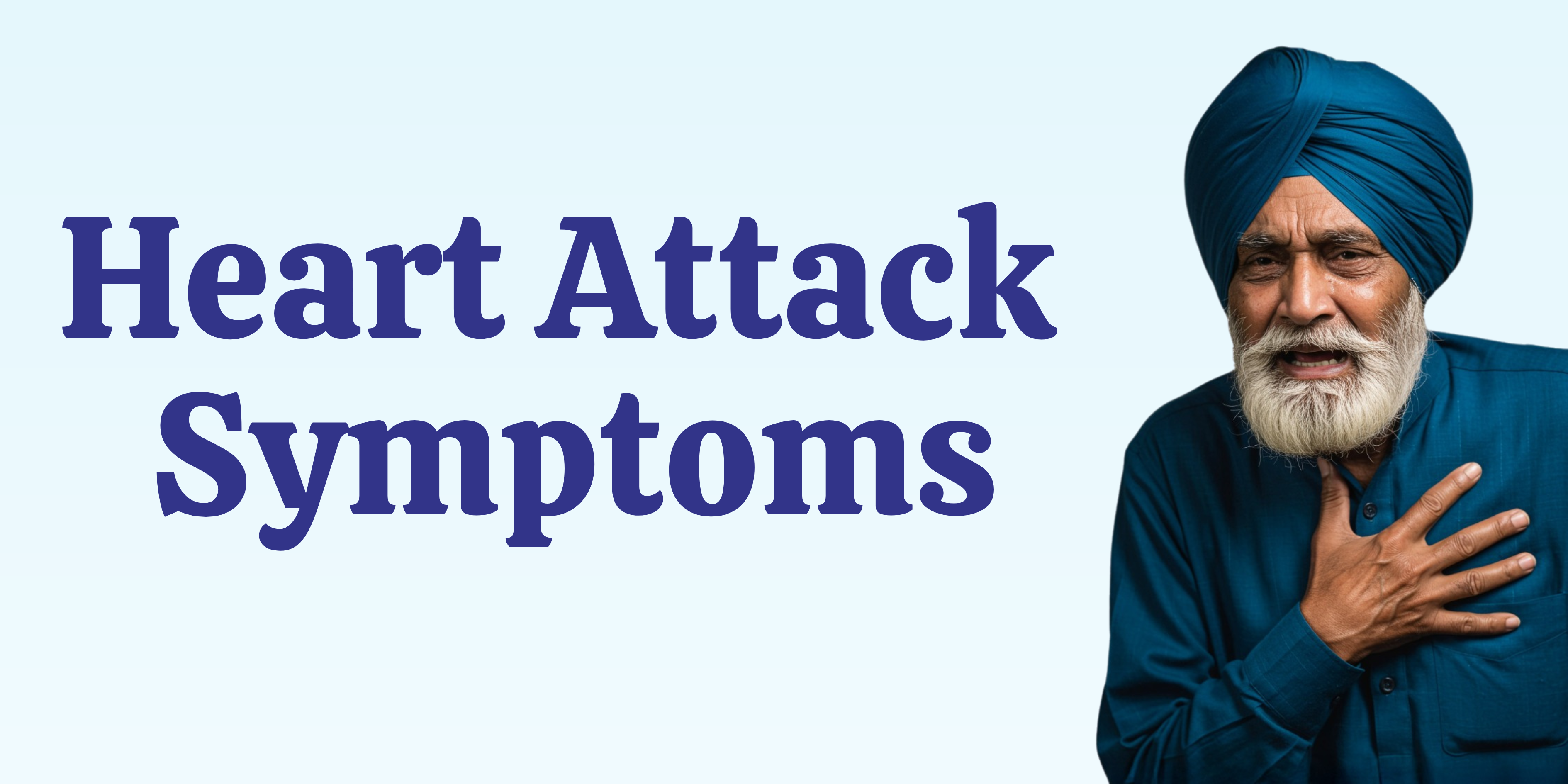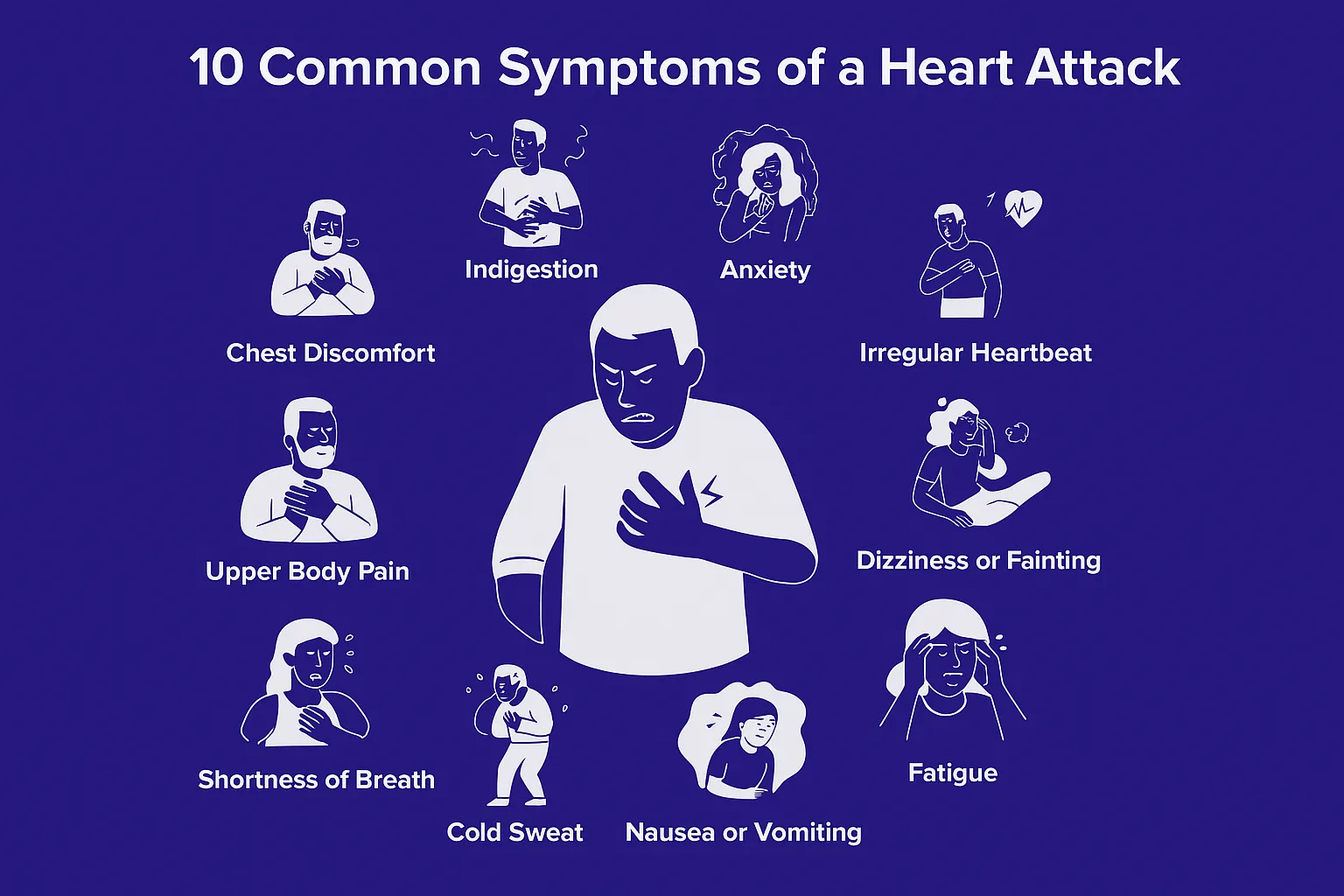03 Feb 2026
Rhinoplasty Revision Surgery in Mohali: Cost When Your First Nose Job Fails


Dr. Harinder K Bali
22 May 2025
Call +91 80788 80788 to request an appointment.
Understanding heart attack symptoms and knowing when to seek emergency care is essential for improving outcomes for patients experiencing cardiac distress. A heart attack, medically referred to as myocardial infarction, occurs when blood flow to the heart is blocked, which can be life-threatening. Awareness of the signs and symptoms can significantly impact survival rates. At Livasa Hospitals, we are dedicated to providing comprehensive cardiac care, ensuring that our patients and their families have access to vital information regarding heart health.

Heart attack symptoms can vary between individuals, and they may not always be the classic chest pain that many expect. Here are some of the common symptoms that one should be aware of:
Recognizing these symptoms early is vital for ensuring effective and timely treatment. If you experience any of these symptoms, especially in combination, seek immediate medical attention.
Various risk factors significantly increase the likelihood of experiencing a heart attack. Understanding these factors can help you take preventative measures. Key risk factors include:
Awareness of these risk factors can empower individuals to make lifestyle changes that enhance their heart health. It’s crucial to consult with healthcare providers about personal risk factors to create a tailored prevention strategy.
Seizing the moment to get emergency help during a heart attack can make a critical difference in patient outcomes. If you or someone you are with exhibits symptoms of a heart attack, do not hesitate to seek emergency medical assistance. The following situations necessitate urgent care:
The “Golden Hour,” the first hour after a heart attack onset, is crucial for increasing the chance of survival and minimizing damage to heart tissue. Therefore, resting or downplaying symptoms may have severe consequences.
Understanding the prevalence and effects of heart attacks can foster better awareness and the urgency to act. Here are some compelling statistics:
These statistics underline the critical need for immediate intervention and highlight the importance of being educated about the signs and symptoms of heart attacks, especially in Punjab where the rates have been increasing.
Punjab has witnessed a concerning rise in cardiac emergencies, highlighting the need for increased awareness and immediate medical intervention. Key factors contributing to this surge include lifestyle changes, dietary habits, and stress levels that culminate from rapid urbanization and economic pressures.
With the onset of stress-related conditions and lifestyle diseases, it is crucial for residents to understand that symptoms of a heart attack can often be subtle and overlooked. This has made timely care even more essential. Resources like Livasa Hospitals are equipped with the latest technology and skilled professionals to tackle cardiac emergencies effectively.
Livasa Hospitals offers specialized cardiac care services throughout Punjab, including facilities in Livasa Mohali, Livasa Amritsar, Livasa Hoshiarpur, Livasa Khanna, and Livasa Nawanshahr. Our dedicated teams are focused on ensuring that patients receive the highest standard of care during cardiac emergencies. By fostering awareness and readiness, we can significantly improve survival rates.
Upon seeking emergency care for heart attack symptoms, various treatment options may be presented based on the individual's specific condition. Common treatments include:
| Treatment Type | Benefits | Recovery Time |
|---|---|---|
| Medications | Helps dissolve blood clots, relieve chest pain, and stabilize heart rhythm. | Varies based on individual response; often within days. |
| Angioplasty and Stenting | Opens blocked arteries and prevents further blockages. | 1-3 weeks for full recovery. |
| Coronary Artery Bypass Grafting (CABG) | Restores blood flow to the heart by creating a bypass. | 4-6 weeks for recovery due to initial surgical trauma. |
Each treatment option carries its benefits and potential risks, and the healthcare team at Livasa Hospitals is dedicated to providing a tailored approach to meet each patient's unique needs, especially in the face of cardiac emergencies across Punjab.
While understanding symptoms and risks is essential, prevention must also be a priority. Here are some practical steps to reduce the risk of heart attacks:
Implementing these lifestyle changes not only helps in preventing heart attacks but also contributes to overall well-being. Consultation with a healthcare provider can offer personalized strategies tailored to your health status and needs.
Recognizing heart attack symptoms and seeking emergency care are paramount for ensuring timely intervention and care. At Livasa Hospitals, we believe that education and awareness are vital components in reducing the incidence of heart attacks within communities across Punjab. By understanding the signs, symptoms, risk factors, and treatment options for heart attacks, patients can empower themselves to take proactive steps toward better heart health.
Remember, if you experience any signs or symptoms of a heart attack, do not delay in seeking help. Lifesaving interventions are available at Livasa Hospitals, where we specialize in cardiac emergency care aimed at providing advanced treatments and compassionate patient care. Always prioritize your heart health and reach out to us for guidance and support.
Early detection saves lives. Book an appointment at Livasa Hospitals today or talk to our specialists for heart health consultations.
Rhinoplasty Revision Surgery in Mohali: Cost When Your First Nose Job Fails
Plastic Surgery After Massive Weight Loss: Body Contouring Packages in Mohali
ENT + Cosmetic in Mohali: Septoplasty for Breathing with Cosmetic Rhinoplasty Offers
Livasa Healthcare Group Corporate Office,Phase-8, Industrial Area, Sector 73, Sahibzada Ajit Singh Nagar, Punjab 160071
| Mohali | +91-99888 23456 |
| Amritsar | +91-99887 49494 |
| Hoshiarpur | +91-99883 35353 |
| Nawanshahr | +91-75081 82337 |
| Khanna | +91-98888 05394 |